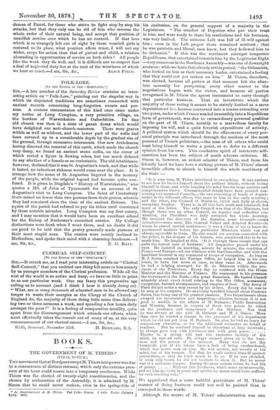FOLK-LORE.
[TO THE EDITOR OF TIIR " &Ter/mu.")
SIR,—A late number of the Saturday Review contains an inter- -eating article on " Folk-Lore," pointing out the singular way in which its disjointed traditions are sometimes connected with ancient records concerning long-forgotten events and per- sons. A curious circumstance of this kind once came under my notice at Long Compton, a very primitive village, on the borders of Warwickshire and Oxfordshire. Its fine old church was then in a state of gaunt decay which would have delighted our anti-church-restorers. There were graves within as well as without, and the lower part of the walls had been covered up to a considerable depth by the gradual rise of the ground, through successive interments. Our new Archdeacon having directed the removal of this earth, which made the church very damp, we found an ancient stone coffin, on the cover of which rested a figure in flowing robes, but too much defaced to say whether of a female or an ecclesiastic. The old inhabitants, however, declared that it was St. Augustine's tomb, and that while it lasted, no infectious sickness would come near the place. It is strange how the name of St. Augustine lingered in the memory of the people, while the original legend had become quite con- fused. It is given in Dugdale's " History of Warwickshire," who quotes a MS. of John of Tynemouth for an account of St. Augustine's visit to Long Compton. The Saint of Canterbury there raised no fewer than two persons from their graves, wherein they had remained since the time of the ancient Britons. The squire of the parish had refused to pay his tithes until convinced by these notable miracles. Long Compton was my first curacy, and 1 may mention that it would have been an excellent school for the Bishop of Rochester's conceited curates. My College distinctions were fresh when I went there, and no doubt it did me good to be told that the gentry generally made parsons of their most stupid sons. The rustics were mostly inclined to Methodism, and spoke their mind with a charming frankness.—I


































 Previous page
Previous page